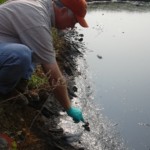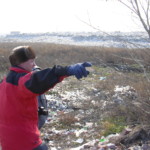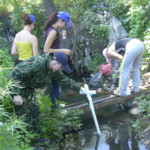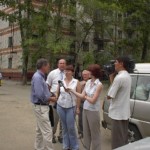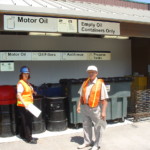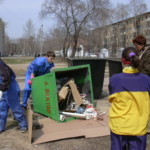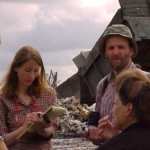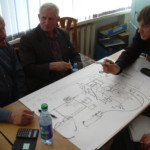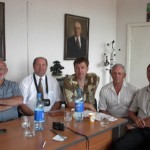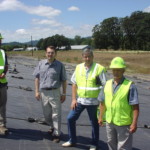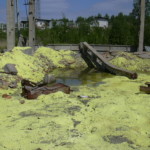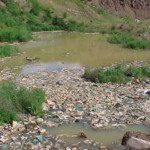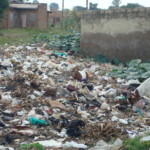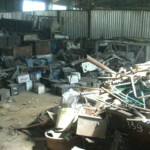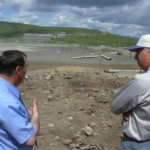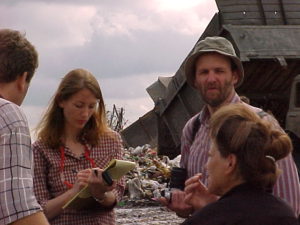
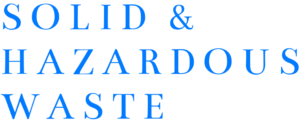
In Khabarovsk the city dump, or свалка, intended to last several decades, began overflowing within a few years of Russia’s economy opening to Chinese manufactured goods. Beyond the obvious environmental problems, ECO International observed a strong dependence of some vulnerable populations on materials recovery at the city dump. ECO International helped the City of Khabarovsk design and build a modern Solid Waste Management System that included source separation of recyclables, improved collection and consolidation, and construction of a lined landfill far away from population centers. Diversion of hazardous waste from the municipal solid waste streams was a major focus and eventually became a separately funded project.
В Хабаровске городская свалка, или свалка, рассчитанная на несколько десятилетий, начала переполняться через несколько лет после того, как ее экономика открылась для китайских промышленных товаров. Помимо очевидных экологических проблем, ECO International отметила сильную зависимость некоторых уязвимых групп населения от восстановления материалов на городской свалке. ECO International помогла городу Хабаровску спроектировать и построить современную систему управления твердыми отходами, которая включала разделение источников вторсырья, улучшенный сбор и консолидацию, а также строительство полигона с футеровкой вдали от населенных пунктов. Перенаправление опасных отходов из потоков твердых бытовых отходов было основным направлением деятельности и в конечном итоге превратилось в проект, финансируемый отдельно.
在哈巴罗夫斯克,旨在持续数十年的城市垃圾场(或称“свалка”)在其经济对中国制成品开放的几年内开始泛滥。 除了明显的环境问题外,ECO International还观察到一些弱势群体对城市垃圾场材料回收的强烈依赖。 ECO International 帮助哈巴罗夫斯克市设计并建立了现代化的固体废物管理系统,其中包括可回收资源的来源分离,改善的收集和整合以及远离人口中心的衬砌垃圾填埋场的建设。 从城市固体废物流中转移危险废物是主要重点,并最终成为一项单独资助的项目。
Solid Waste Management Initiative - Khabarovsk, Russia
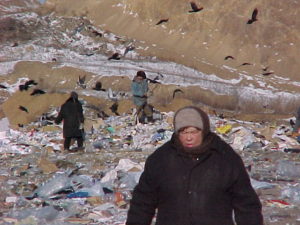 In December 1999, less than a decade after the dissolution of the Soviet Union, the Portland Khabarovsk Sister City Association dispatched ECO International’s founder and Executive Director Thomas Benke to confer with the Khabarovsk City Administration about environmental issues. The City of Khabarovsk identified its overwhelmed municipal garbage system as a good starting point for collaboration. A multi-year, multi-phase series of exchanges of Portland and Khabarovsk municipal officials ensued, all coordinated and lead by Benke (as PKSCA Director of Environmental Programs) with funding by the U.S. Information Agency (through Sister Cities International and the Portland State University Free Market Business Development Institute) and the U.S. Agency for International Development (through Ecolinks and the Foundation for Russian American Economic Cooperation). “In-Kind”, “Matching” and/or “Cost Share” contributions of participating organizations and individuals leveraged cash funding by more than 3:1. In 2011, Khabarovsk’s mayor wrote to Portland’s mayor about the “inauguration of a new city site for the burial of municipal solid wastes in Khabarovsk.” Mayor Sokolov added that “Its construction would be impossible without the hard work of Russian specialists together with their American colleagues from Portland with the active support from Portland-Khabarovsk Sister City Association.”
In December 1999, less than a decade after the dissolution of the Soviet Union, the Portland Khabarovsk Sister City Association dispatched ECO International’s founder and Executive Director Thomas Benke to confer with the Khabarovsk City Administration about environmental issues. The City of Khabarovsk identified its overwhelmed municipal garbage system as a good starting point for collaboration. A multi-year, multi-phase series of exchanges of Portland and Khabarovsk municipal officials ensued, all coordinated and lead by Benke (as PKSCA Director of Environmental Programs) with funding by the U.S. Information Agency (through Sister Cities International and the Portland State University Free Market Business Development Institute) and the U.S. Agency for International Development (through Ecolinks and the Foundation for Russian American Economic Cooperation). “In-Kind”, “Matching” and/or “Cost Share” contributions of participating organizations and individuals leveraged cash funding by more than 3:1. In 2011, Khabarovsk’s mayor wrote to Portland’s mayor about the “inauguration of a new city site for the burial of municipal solid wastes in Khabarovsk.” Mayor Sokolov added that “Its construction would be impossible without the hard work of Russian specialists together with their American colleagues from Portland with the active support from Portland-Khabarovsk Sister City Association.”
Click on the picture at left for a video made by the City of Khabarovsk describing its solid waste program.
Hazardous Waste Management Initiative - Khabarovsk, Russia
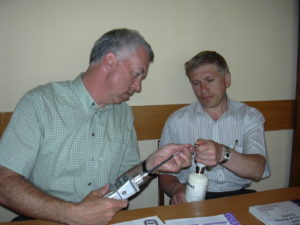 In June 2004 ECO International was asked by the Khabarovsk Krai Ministry of Natural Resources to survey and report on hazardous waste management in the region. The two week survey culminated in a report to Minister Pocherevin in which ECO International recommended that the Krai develop a market based system for the management of hazardous waste and that it begin immediately to mitigate the adverse effects of hazardous waste improperly discarded in the past.
In June 2004 ECO International was asked by the Khabarovsk Krai Ministry of Natural Resources to survey and report on hazardous waste management in the region. The two week survey culminated in a report to Minister Pocherevin in which ECO International recommended that the Krai develop a market based system for the management of hazardous waste and that it begin immediately to mitigate the adverse effects of hazardous waste improperly discarded in the past.

